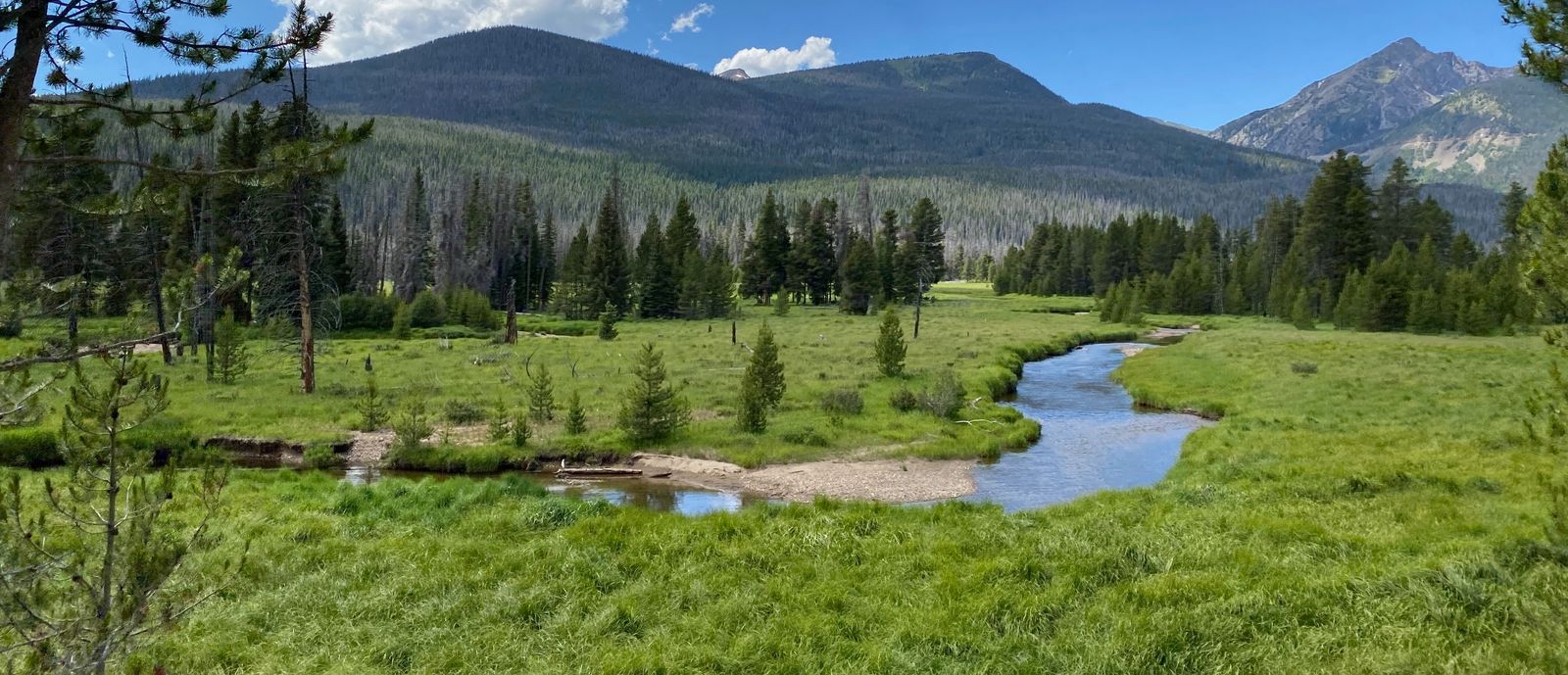You may wonder whether an RV actually saves you money—or causes you to spend a lot more. In the nearly 10 years my family has owned an RV, we’ve saved more money than we have spent. Let’s take a look at how this can be true by comparing the costs of an RV vacation versus flying.
As John Muir once said, “The mountains are calling, and I must go.” As much as I love RVing, I love mountains even more. So, for this RVing cost comparison we will look at the price of a weeklong trip to one of my most beloved spots: Rocky Mountain National Park, a land of ponderous peaks and pines. We’ve taken this trip in our family RV three times already and certainly will take it again in the future.
This cost estimate is based on a family of four traveling from our home near Springfield, Missouri, and compares two travel options:
- Option 1: Flying, renting a car, and staying in a hotel
- Option 2: RVing with a pick-up truck and bunkhouse travel trailer
Which do you think will come out ahead?
The Caveats
Before we compare the costs of flying versus RVing, I do have a few caveats to my budget estimates:
- Many elements of this trip could vary greatly by your specific dates, travel preferences, vehicles, and family dynamics, which significantly affect the costs.
- I picked the options my family would realistically make for flights and accommodations. These might be different from what you would choose.
- If you are driving a larger vehicle while RVing than you would drive while flying or road tripping, you will have additional gas costs while exploring the park.
- When RVing, you may have to spend more than a day traveling, unlike flying, adding additional costs for campground fees and food.
- Costs are estimated based on current prices found online. However, they do not include taxes and additional fees.
Travel Cost Comparison: Flying Versus RVing
When looking at travel costs for a trip to Rocky Mountain National Park, driving is a lot cheaper than flying. Flying and renting a car would cost nearly $2,300 for direct flights to Denver for our family of four out of our local airport with an economy-sized rental for the week. Travel costs for RVing would be around $800 for fuel, extra nights in the campground, and additional meals and snacks.
This trip estimate includes renting a car if you opt to fly. While some destinations offer public transportation, Rocky Mountain National Park is almost 75 miles from the Denver Airport. Not only would a rental be helpful for traveling to and from the airport, it would be difficult to explore the park without a vehicle of your own.
Final estimation: RVing is around $1,500 cheaper than flying and renting a car, offering a significant savings.
Accommodations Cost Comparison: Hotel Versus Campground
When traveling to Rocky Mountain National Park, people often choose the beautiful city of Estes Park as a basecamp because it allows for easy access to the park and a wide range of accommodation options, as well as restaurants, entertainment, and more.
For hotel stays, Estes Parks offers everything from budget options to luxurious resorts, ranging in price from $150 to over $300 per night. When my family books hotels, we tend to reserve places like Holiday Inn, which are on the lower end but not the cheapest, so that’s what I used in my estimate for this trip at a cost of $225 per night.
Similarly, RVers will find a range of campground options. Public campgrounds cost around $30 to $65, while private parks with more amenities run $150 or more per night. My family prefers to have hookups, but we wouldn’t require other amenities for this trip. In the past, we’ve stayed at Mary’s Lake Campground, a public park operated by the city of Estes Park at a cost of $65 a night for full hookups.
Ultimately, in the head-to-head comparison of hotels versus campgrounds, camping is significantly cheaper. A week in a hotel in Estes Park for our family would potentially cost nearly $1,600, while a campsite with full hookups would be less than $500.
Final estimation: RVing saves $160 per night for a total of $1,100 in accommodation costs when compared to flying for our weeklong stay.
Considering Food Costs
Food is another significant expense for any vacation. For our trip, food is definitely more expensive for a hotel than a campground for our family but this can vary greatly depending on whether you grocery shop and prepare your own meals, or eat out three meals a day.
For breakfasts, we enjoy simple meals we can stock in our RV refrigerator and pantry like yogurt or cereal. Similarly, we either pack a lunch or eat lunch out while exploring. Dinner is a different story. While staying in a campground, we have the opportunity to easily prepare good meals in the RV. Obviously, this is not possible in a hotel and could be a major savings for many families. Ultimately, if your hotel stay involves dining out for all three meals, you can expect to spend a lot more than you would by camping, potentially $100 or more per day per person. It’s important to think about your own habits and preferences.
Miscellaneous Expenses to Consider
When considering the cost of an RV trip versus flying or road tripping, here are a few “hidden” benefits and costs:
- RVers can save significantly on entertainment costs if you consider the campground part of your entertainment. This is especially true while camping with kids in parks with onsite activities and amenities. We sometimes plan “park days” where we simply enjoy the campground.
- You may also consider the cost of the RV itself. For my family, the annual cost of our RV payment, insurance, repairs, and maintenance is around $3,200–see the included list for a breakdown of expenses. This would be significantly less if we owned our RV outright. This would be significantly more if we financed a pricier RV. Your costs certainly may vary significantly.
The Bottom Line: Flying Versus RVing
If we do the math for travel and accommodations alone for a weeklong trip to Rocky Mountain National Park from Springfield, here are the totals for our family of four:
- Option 1 (Flying): $3,835
- Option 2 (RVing): $1,265
RVing is significantly less than flying, over $2,500 less for this scenario, a savings of almost 66 percent. The costs of hotel accommodations and a rental car more than makes up for any increased fuel costs, and that multiplies even more for longer stays.
What About Road Tripping Versus RVing?
In our situation, another realistic option for reaching Rocky Mountain National Park would be to road trip in my gas-saving crossover vehicle and leave our RV at home. Truth be told, I thought this would come out as the cheapest option before I did the math; however, my estimate for road tripping in a car comes in at $1,845, which is $600 more than the cost of RVing.
Though we would save significantly on gas while driving a car instead of RVing, the cost of a hotel eats away the savings. RVing still wins!
What About the Intangible Costs?
For my family, RVing isn’t simply about the budget. We enjoy many non-monetary benefits of RVing, including:
- Campground atmosphere: Imagine hanging out around a campfire with a view of the Rockies instead of sitting in a hotel room/lobby. This is one of my favorite parts of RVing!
- Connection to the environment: While camping, you are more directly connected to the location’s landscape. One of my favorite memories is waking up to watch the sun rise over the Rocky Mountains during a stay at Mary’s Lake Campground in Estes Park. The skies filled with a rainbow of colors before the spotlight of the sun finally emerged from the silhouette peaks. Could I have experienced this in a hotel? No way!
- Finding joy in the journey: I don’t fly often, but when I do, I can’t say that I’ve enjoyed the airport experience. However, when RVing, the journey is as important as the destination. There’s nothing like seeing the flat grasslands of Kansas turn into spectacular mountain peaks in Colorado.
- Inspired to travel more: Saving money on travel costs encourages us to travel more. I would not be likely to spend $300+ on hotels for local weekend trips, but I will definitely book a campground when the trip costs less than $100.
- Having your own items: When you RV, there’s no need to worry about bed bugs and comfy pillows. Also, it’s much easier to pack everything you need in an RV instead of a suitcase. As a person who likes routine, I like carrying my home on wheels with me wherever I go.
As you can see, RVing can certainly be cheaper than flying or road tripping, but the benefits extend far beyond the pocketbook. Ultimately, you are investing in an RV, but you are also investing in a whole lifestyle, one that offers benefits far beyond the budget of a weeklong vacation.






















